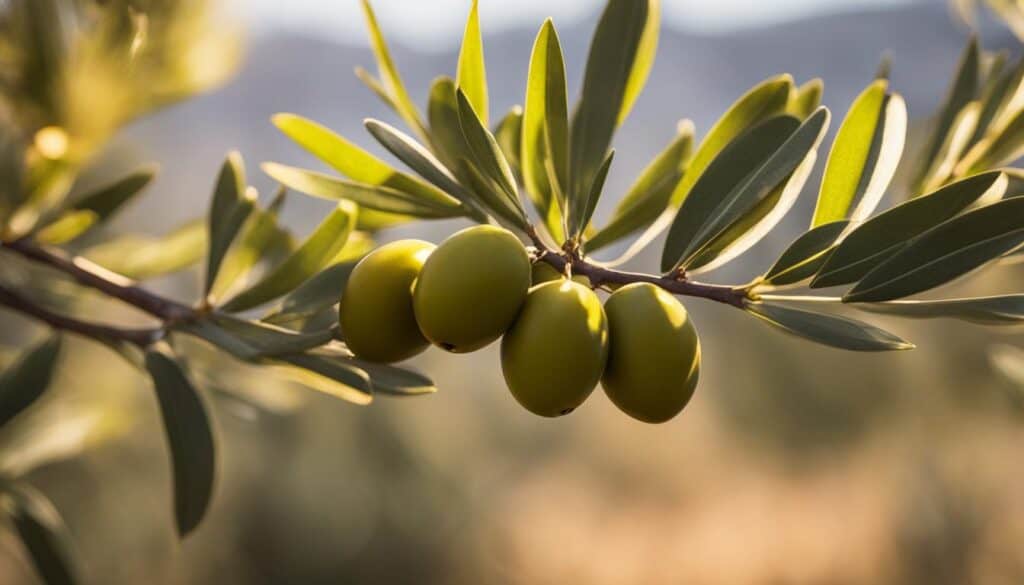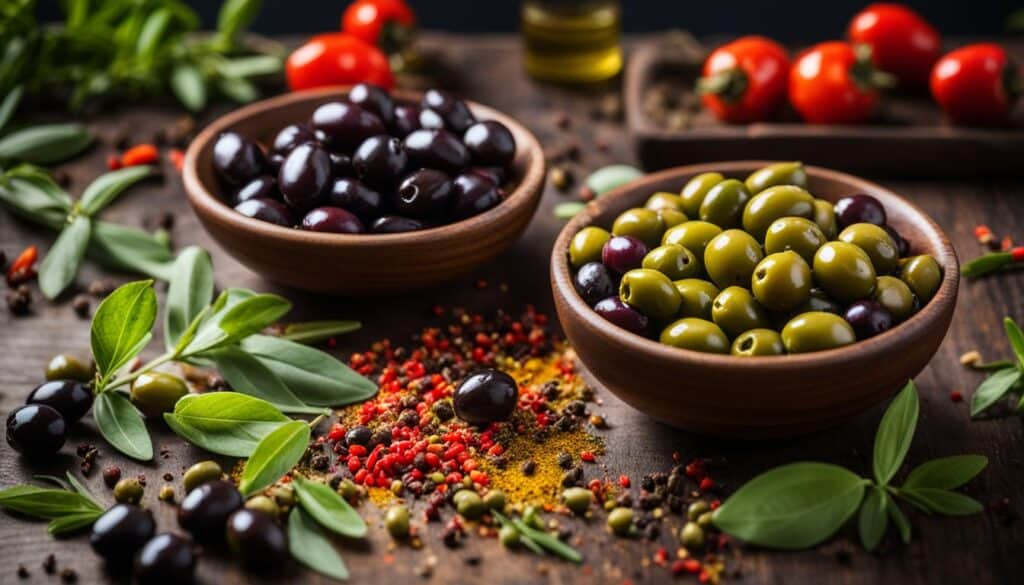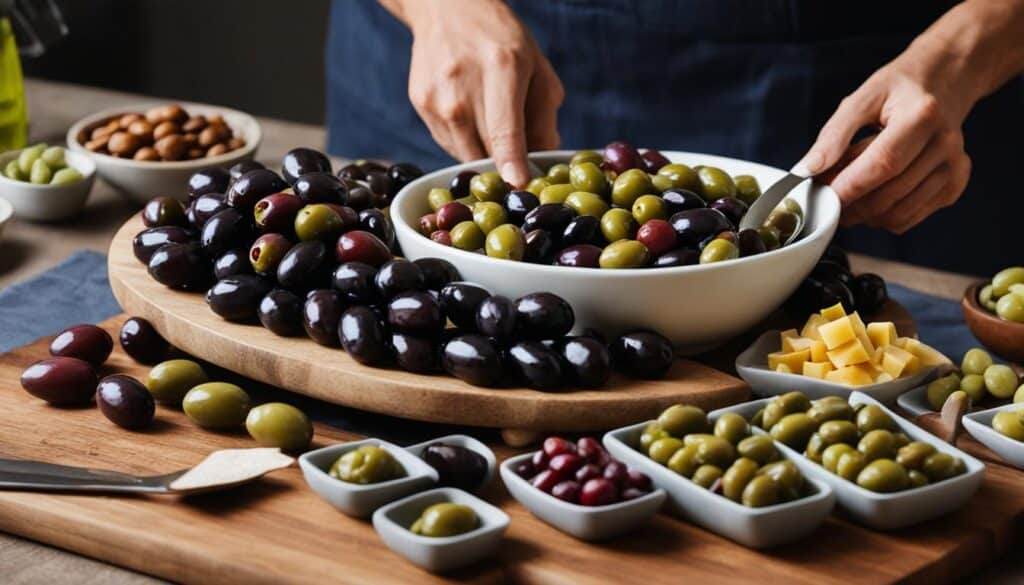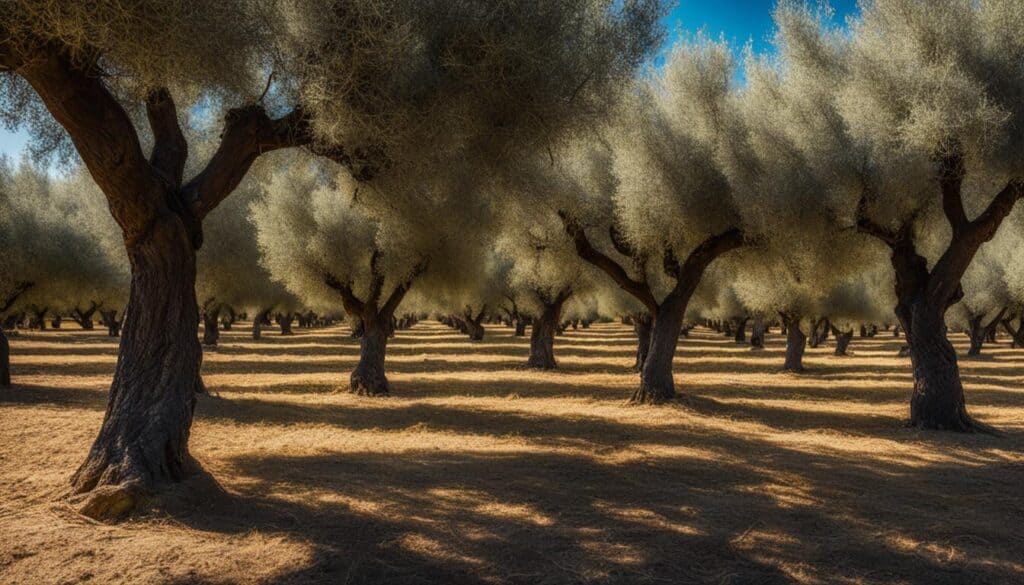Have you ever wondered which fruit gives us oil? Well, the answer might surprise you! There are several fruits that are known for their oil-producing properties, and today I’m going to unveil one of the most fascinating ones – the prickly pear fruit.
Prickly pear seed oil, also known as “barbary fig seed oil” or “cactus oil,” is a lightweight yet potent oil that is extracted from the seeds of the prickly pear fruit. This fruit, with its vibrant colors and unique shape, holds the secret to a powerful and nourishing oil.
So, why is prickly pear seed oil so special? This oil is packed with essential fatty acids, antioxidants, and vitamins, making it highly beneficial for the skin. Whether you have dry, oily, or sensitive skin, prickly pear seed oil can work wonders for you.
Are you curious about the beauty benefits of prickly pear seed oil? Do you want to know more about its versatility and uses in skincare and haircare? Did you know that olives are also a fruit that gives us oil? Stay with me as we uncover all of this and more in this fascinating exploration of oil-producing fruits!
Key Takeaways:
- Prickly pear seed oil is a lightweight yet potent oil extracted from the seeds of the prickly pear fruit.
- It is widely used in skincare products due to its nourishing properties and is suitable for all skin types.
- Prickly pear seed oil deeply nourishes the skin, locks in moisture, and acts as a natural shield against premature aging.
- It also has anti-inflammatory properties, making it suitable for sensitive skin.
- Stay tuned as we delve into the beauty benefits, versatility, and uses of prickly pear seed oil, as well as the fascinating world of olives!
The Beauty Benefits of Prickly Pear Seed Oil
When it comes to natural beauty remedies, one fruit-based oil stands out for its exceptional benefits – prickly pear seed oil. This oil, extracted from the seeds of the prickly pear fruit, packs a powerful punch with its rich concentration of essential fatty acids, antioxidants, and vitamins.
“Prickly pear seed oil is a game-changer in skincare, offering remarkable nourishment and protection for the skin.”
One of the key advantages of prickly pear seed oil is its ability to deeply nourish and moisturize the skin. With its high content of omega-6 and omega-9 fatty acids, this oil replenishes the skin’s lipid barrier, preventing moisture loss and ensuring a soft, supple complexion.
In addition to its hydrating properties, prickly pear seed oil acts as a natural shield against premature aging. The antioxidants present in the oil help neutralize free radicals, protecting the skin from damage caused by environmental stressors. Regular use of prickly pear seed oil can help minimize the appearance of fine lines, wrinkles, and age spots, promoting a youthful and radiant complexion.
Furthermore, prickly pear seed oil is well-known for its anti-inflammatory properties, making it an ideal choice for those with sensitive or reactive skin. It can soothe redness, calm irritation, and reduce inflammation, helping to restore the skin’s balance and promote a healthier complexion.
Whether you’re looking to enhance your skincare routine or address specific skin concerns, incorporating prickly pear seed oil into your beauty regimen can yield remarkable results. Its natural composition and nourishing properties make it a go-to ingredient for healthy, glowing skin.
The Versatility of Prickly Pear Seed Oil
Prickly pear seed oil is not just a beauty elixir; it is a versatile natural fruit oil that offers numerous benefits for both the skin and hair. Its wide range of uses and incredible properties make it a must-have ingredient in any skincare routine. Let’s explore the various ways you can incorporate this precious oil into your beauty regimen.
Hydrate and Nourish Dry Skin
One of the remarkable benefits of prickly pear seed oil is its ability to hydrate and nourish dry skin. Its high content of essential fatty acids, including linoleic acid, helps to lock in moisture and restore the skin’s natural barrier. Regular use of this oil can leave your skin feeling soft, supple, and rejuvenated.
Soothe Irritated Skin
If you have sensitive or irritated skin, prickly pear seed oil can provide much-needed relief. With its anti-inflammatory properties, this oil helps calm redness, reduce irritation, and soothe sensitive skin. Its gentle yet effective formulation makes it suitable for even the most delicate skin types.
Reduce the Appearance of Fine Lines and Wrinkles
Prickly pear seed oil is known for its anti-aging benefits. Packed with antioxidants, vitamins, and minerals, it helps fight free radicals and promotes cell renewal, which can lead to a more youthful complexion. Regular application of this oil can help reduce the appearance of fine lines and wrinkles, giving you smoother and firmer-looking skin.
Natural Hair Conditioner and Promotes Healthy Hair Growth
Don’t limit the benefits of prickly pear seed oil to just your skin; your hair can also benefit from this amazing natural fruit oil. Use it as a hair conditioner to nourish and hydrate dry, damaged hair, leaving it soft and manageable. Its lightweight formula won’t weigh your hair down or make it greasy. Additionally, the vitamins and minerals present in prickly pear seed oil can help promote healthy hair growth, making your locks look lustrous and vibrant.
Prickly Pear Seed Oil: A Versatile Beauty Essential
This versatile oil provides a multitude of benefits for both skin and hair. Whether you are looking to hydrate dry skin, soothe irritation, reduce signs of aging, or improve the health and appearance of your hair, prickly pear seed oil has got you covered. Embrace the power of natural fruit oil options and experience the amazing benefits that prickly pear seed oil has to offer.
I hope the information provided in this section has given you insights into the versatility and benefits of prickly pear seed oil. In the next section, we will delve into the history and uses of anointing oil in biblical times, exploring its significance and health benefits.
The Anointing Oil in Biblical Times
In biblical times, the anointing oil played a significant role in various ceremonies and rituals. It was not just a mere oil; it was believed to possess supernatural properties and was used for blessings, healing, and consecration.
The anointing oil was made using a specific formula given by God to Moses. It consisted of a blend of pure olive oil, fragrant spices, and other natural ingredients. The oil was carefully prepared and sanctified by the priests before being used.
The anointing oil held great symbolic significance in biblical culture. It represented the presence of God and His favor upon the individual being anointed. It signified consecration, empowerment, and divine protection.
The health benefits of anointing oil were also recognized in biblical times. The use of anointing oil for healing purposes can be found throughout the Bible. In the book of James, it is written, “Is anyone among you sick? Let them call the elders of the church to pray over them and anoint them with oil in the name of the Lord. And the prayer offered in faith will make the sick person well; the Lord will raise them up” (James 5:14-15).
“The anointing oil was seen as a symbol of God’s provision and healing power.”
The anointing oil was not just a physical substance; it represented the presence and power of God Himself. It was used to invoke and demonstrate God’s intervention and healing in the lives of individuals. The act of anointing with oil was a spiritual act that conveyed faith, hope, and trust in God’s ability to heal.
The Ingredients of the Anointing Oil
The anointing oil mentioned in the Bible was a blend of several fragrant spices. Here are the ingredients commonly used:
- Cassia: A sweet and aromatic spice with healing properties.
- Cinnamon: Known for its warming properties and pleasant scent.
- Myrrh: A resinous substance with antimicrobial and healing properties.
- Frankincense: A resin that emits a pleasant aroma and symbolizes worship and prayer.
- Olive oil: The base oil, which represents purity and is rich in nutrients and antioxidants.
Ingredients of the Anointing Oil
| Ingredient | Properties |
|---|---|
| Cassia | Sweet and aromatic spice with healing properties |
| Cinnamon | Warming properties and pleasant scent |
| Myrrh | Antimicrobial and healing properties |
| Frankincense | Pleasant aroma and symbolizes worship and prayer |
| Olive oil | Base oil, represents purity and is rich in nutrients and antioxidants |
The combination of these ingredients created a fragrant and potent oil that symbolized God’s favor, healing, and blessing.
While the anointing oil held great significance in biblical times, its use today varies among different religious and cultural traditions. However, the belief in the anointing oil’s power and the recognition of its health benefits continue to resonate with many individuals.
The Symbolism of Olives in the Bible
The Bible mentions olives in various contexts, where they symbolize peace, wisdom, and divine provision. The olive tree is often described as a symbol of God’s people, representing strength, endurance, and fruitful lives. The abundant olive oil derived from the olives carries significant symbolism as well, representing the anointing and healing power of God.
“…he [the righteous person] is like an olive tree flourishing in the house of God; he trusts in God’s unfailing love forever and ever.” – Psalm 52:8
The olive tree is mentioned numerous times throughout the Bible, highlighting its significance. It is associated with blessings, fruitful abundance, and the establishment of a covenant between God and His people. In the book of Genesis, an olive branch is brought back to Noah’s Ark by a dove, symbolizing peace and the end of the great flood. In the book of Exodus, olive oil is used as a key ingredient in the preparation of the sacred anointing oil.
“Then take the anointing oil and anoint him by pouring it on his head.” – Exodus 29:7
The olive oil’s anointing power is also evident in the New Testament. In the parable of the Good Samaritan, the Good Samaritan pours olive oil and wine on the wounds of the injured man, symbolizing compassion and healing. The olive oil is seen as a representation of God’s provision and care for His people.
The symbolism of olives goes beyond their physical properties and taste. They serve as powerful reminders of God’s love, peace, and wisdom. The olive tree and its fruit have a rich spiritual significance, offering a glimpse into the divine mysteries and teachings of the Bible.

Olives – The Unexpected Fruit
In the world of fruits, olives stand out as an unexpected delight. Most people associate fruits with sweet flavors and vibrant colors, but olives offer a unique taste and texture that sets them apart.
Did you know that olives belong to the category of fruits called drupes? A drupe is a type of fruit that has an outer fleshy layer surrounding a hard pit or stone. Other examples of drupes include cherries, peaches, and plums. This classification places olives in the same botanical family as these familiar fruits.
Olives grow on the olive tree, scientifically known as Olea europaea. This evergreen tree is native to the Mediterranean region and can be found in other parts of the world with suitable climates. The olive tree has been cultivated for centuries for its fruits, which offer a wide range of culinary and health benefits.
One of the fascinating aspects of olives is their diverse range of varieties. There are numerous olive cultivars, each with its own characteristics and flavor profile. Some popular varieties include:
- Manzanilla: Known for its large size and mild, buttery flavor.
- Kalamata: Famous for its dark color, rich taste, and use in Greek cuisine.
- Empeltre: Commonly used in Spanish dishes and prized for its sweet and fruity flavor.
- Picholine: Recognized for its small size, firm texture, and slightly nutty taste.
These are just a few examples of the many olive varieties that exist, each contributing its own unique characteristics to the world of culinary delights.
“The olive is a gift of nature, and it brings a touch of elegance and richness to any dish.” – Unknown
Whether enjoyed raw as a snack, cured and marinated for added flavor, or pressed to extract their precious oil, olives continue to surprise and captivate taste buds worldwide.

The Nutritional Benefits of Olives
When it comes to nutritional powerhouses, olives certainly make the list. These small fruits pack a punch with their abundance of healthy fats, antioxidants, and vitamins. Whether enjoyed on their own or as part of a delicious dish, olives offer numerous health benefits that make them a valuable addition to any diet.
One of the standout nutritional benefits of olives is their rich content of healthy fats. Olives are a great source of monounsaturated fats, which are known for their heart-healthy properties. These fats help to lower the levels of LDL (bad) cholesterol in the body, reducing the risk of heart disease. Additionally, the healthy fats in olives contribute to satiety, promoting feelings of fullness and aiding in weight management.
In addition to their healthy fats, olives are loaded with antioxidants. These powerful compounds help to neutralize harmful free radicals in the body, protecting our cells from oxidative stress. The antioxidants found in olives, such as polyphenols and vitamin E, have been linked to a range of health benefits, including reducing inflammation, improving brain function, and supporting a healthy immune system.
Furthermore, olives are a great source of essential vitamins and minerals. They contain vitamin E, which is known for its antioxidant properties and its role in promoting healthy skin and hair. Olives also provide important minerals like iron, copper, and calcium, which contribute to various bodily functions, including blood production, energy metabolism, and bone health.
Overall, olives are a nutritious and delicious addition to your diet. Their healthy fats, antioxidants, and essential nutrients make them an excellent choice for supporting heart health, fighting oxidative stress, and promoting overall well-being.

Nutritional Content of Olives
| Nutrient | Amount per 100g |
|---|---|
| Calories | 115 |
| Total Fat | 11g |
| Saturated Fat | 1.6g |
| Monounsaturated Fat | 7.9g |
| Polyunsaturated Fat | 0.8g |
| Carbohydrates | 3.8g |
| Fiber | 3.2g |
| Protein | 0.8g |
| Vitamin E | 3.8mg |
| Iron | 3.3mg |
| Copper | 0.2mg |
| Calcium | 88mg |
Culinary Uses of Olives
When it comes to culinary versatility, olives are the stars of the show. They are not only delicious in their own right but also lend their unique flavors to a variety of dishes. Let’s dive into the wonderful world of olives and explore their culinary uses.

One of the most popular uses of olives is in the production of olive oil. Olive oil is a staple in Mediterranean cuisine and is widely used in recipes around the world. Its rich, fruity flavor adds depth and complexity to dishes, whether drizzled over salads, used in marinades, or as a base for sauces and dressings.
Olives also take center stage in the creation of delectable condiments like tapenade. Made from crushed or finely chopped olives, tapenade is a versatile spread that can be enjoyed on crusty bread, used as a topping for grilled meats and fish, or incorporated into various recipes for an added burst of flavor.
Furthermore, olives serve as a delightful garnish that enhances the taste and presentation of numerous dishes. Whether it’s a vibrant salad, a cheesy pizza, or a comforting pasta dish, a sprinkle of olives adds a tangy and savory twist to elevate the overall culinary experience.
With their diverse flavors and textures, olives are a culinary delight that can be enjoyed in many ways. From the richness of olive oil to the boldness of tapenade and the finishing touch of garnishing, olives are a versatile ingredient that brings depth and character to a wide range of dishes.
Olives Around the World
Olives are widely cultivated around the world, with Spain, Italy, and Greece being the top producers. The olive tree and its products have a global presence and are recognized as symbols of peace and wisdom.
The cultivation and production of olives have a rich history, dating back thousands of years. These small fruits have made a significant impact on Mediterranean cuisine and have become an essential ingredient in various dishes and condiments.
To give you a better understanding of the global presence of olives, let’s take a closer look at the top olive producers:
| Country | Production (in tons) |
|---|---|
| Spain | 1,390,000 |
| Italy | 310,000 |
| Greece | 240,000 |
| Turkey | 180,000 |
| Tunisia | 130,000 |

Spain takes the lead as the top olive producer, followed by Italy and Greece. These countries have ideal climatic conditions and a long-standing tradition of olive cultivation, ensuring the production of high-quality olives and olive oil.
The global presence of olives extends beyond the Mediterranean region. Other countries, such as Turkey and Tunisia, also contribute significantly to olive production.
Olives have become a symbol of peace, health, and wisdom, connecting people from different cultures and continents. The delicious taste and nutritional benefits of olives continue to captivate palates worldwide.
Appreciating the Marvelous Olive
The humble olive is a treasure trove of taste, nutrition, and versatility. Its rich history and unique characteristics make it a fascinating fruit worth exploring. Let’s delve into some fascinating facts about olives and embark on a journey of olive exploration.
Fascinating Facts About Olives
- Olives have been cultivated for thousands of years and have played vital roles in ancient civilizations.
- There are over 2,000 varieties of olives around the world, each with its own distinct flavor profile.
- Olives are classified as fruits and belong to the same family as peaches and cherries.
- Unlike other fruits, olives are not typically eaten fresh off the tree due to their intensely bitter taste. They undergo processes like curing or pressing to make them palatable.
- The olive tree can live for hundreds of years, with some trees still producing olives after a millennium.
- Olives have been used as symbols of peace and wisdom since ancient times.
Exploration of Olives
“To truly appreciate olives, one must explore their diverse uses and discover the endless possibilities they offer in the culinary world.”
The exploration of olives goes beyond their role as a tasty addition to salads and pizzas. Olive oil, derived from pressed olives, is renowned for its versatility in cooking, baking, and even skincare. The distinctive flavors of olive varieties can be savored in tapenades, spreads, and infused oils.
Olive exploration also involves learning about the nutritional benefits they provide. These nutritious gems are rich in monounsaturated fats, antioxidants, vitamins, and minerals, making them a healthy addition to a balanced diet.
With their remarkable taste, health benefits, and culinary versatility, olives truly deserve our appreciation. Embark on an exploration of olives and discover the wonders of this marvelous fruit.
Conclusion
The fascinating journey through the world of olives has enriched my appreciation for this remarkable fruit. Exploring their diverse culinary uses and understanding their nutritional benefits has opened up a whole new realm of possibilities in my culinary adventures.
Olives are not just an ordinary fruit; they are a treasure trove of taste, versatility, and healthfulness. Whether it’s savoring their rich flavors in a Mediterranean-inspired dish or drizzling olive oil over a fresh salad, olives offer a delightful experience to the senses.
But the exploration of olives goes beyond their culinary appeal. It unveils the symbiotic relationship between nature’s bounties and our well-being. Olives have been cherished for their healing properties and symbolize peace and wisdom. They remind us to appreciate the gifts of the earth and embrace a healthful way of living.
FAQ
Which fruit gives us oil?
Olives are the fruit that gives us oil. Olive oil is extracted from the fruits of the olive tree.
What are some other oil-producing fruits?
Besides olives, there are several other fruits that can be used for oil extraction, such as avocados, coconuts, and various seeds like sunflower seeds and sesame seeds.
What are the benefits of using fruit oils for cooking?
Fruit oils, like olive oil and avocado oil, offer health benefits such as providing healthy fats, antioxidants, and vitamins. They can also add flavor and richness to dishes.
What are some natural fruit oil options for skincare?
Prickly pear seed oil and argan oil are popular natural fruit oils used in skincare products. They offer nourishing and moisturizing properties for the skin.
How can prickly pear seed oil benefit the skin?
Prickly pear seed oil is rich in essential fatty acids, antioxidants, and vitamins. It deeply nourishes and moisturizes the skin, protects against premature aging, and soothes inflammation.
What are the uses of prickly pear seed oil?
Prickly pear seed oil can be used as a beauty elixir for various skincare needs, including hydrating dry skin, soothing irritated skin, and reducing the appearance of fine lines and wrinkles. It can also be used as a natural hair conditioner.
What is the significance of anointing oil in biblical times?
Anointing oil was used in biblical times for various purposes, including blessing and healing. It was believed to have supernatural properties and was used to anoint the sick by the elders of the church.
What does olive oil symbolize in the Bible?
Olives and olive oil symbolize peace, wisdom, and divine provision in the Bible. The olive tree is often associated with God’s people, and olive oil represents God’s anointing and healing power.
Are olives classified as a fruit?
Yes, olives are classified as a fruit. Specifically, they are considered a drupe, which is a type of fruit that has a fleshy outer layer and a hard inner shell.
What are the nutritional benefits of olives?
Olives are rich in healthy fats, antioxidants, and vitamins. They promote heart health, fight off oxidative stress, and provide essential nutrients like vitamin E, iron, copper, and calcium.
What are some culinary uses of olives?
Olives can be used in various culinary creations. They are commonly used to make olive oil, which is a staple in Mediterranean cuisine. Olives can also be made into delicious condiments like tapenade and used as a flavorful garnish for salads, pizzas, and pasta dishes.
Which countries are the top olive producers?
Spain, Italy, and Greece are the top producers of olives in the world.
What makes olives a marvelous fruit?
Olives are marvelous due to their taste, versatility in culinary applications, and numerous health benefits. Exploring the world of olives adds depth and enjoyment to their consumption.





Leave a Reply